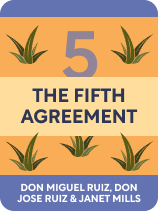

This article is an excerpt from the Shortform book guide to "The Fifth Agreement" by Don Miguel Ruiz. Shortform has the world's best summaries and analyses of books you should be reading.
Like this article? Sign up for a free trial here .
What is the first agreement of Toltec enlightenment? What does it mean to choose your words wisely?
In The Fifth Agreement, don Miguel Ruiz and don Jose Ruiz discuss the five agreements in Toltec enlightenment. The first agreement is to choose your words wisely—or, as they put it, to be impeccable with your words. They emphasize that you must be careful not to use words as weapons against yourself or others.
Keep reading to learn how it’s important to choose your words wisely.
Choose Your Words Wisely
The first agreement in the Toltec process is to be impeccable with your words. That is, choose your words wisely. In the mirage of “the real world,” we use words to denigrate, criticize, and attack not just those we dislike, but our friends, our children, and even ourselves.
“Choose your words wisely” means don’t weaponize your words against yourself. Don’t describe yourself in hurtful ways, inside your head or aloud—for example, by telling yourself you’re ugly, stupid, or a failure. When you do that, you accept those messages as truth and make those negative beliefs a part of your reality. It’s no wonder you’re not happy when you see yourself that way.
(Shortform note: Another important thing to remember is that self-criticism typically doesn’t reflect reality. For example, psychologists note that those who self-criticize often feel that they receive less support from others, that they’re less attractive, and that they’re less happy than others. However, studies show that in most cases, these feelings don’t reflect their reality—instead, the tendency to self-criticize trains us to overestimate the negative aspects of our experience and underestimate the positive.)
Instead, allow yourself to be as you are without judgment—nothing about you is inherently imperfect, even if you’ve been taught to believe otherwise. Don’t demand any more from yourself.
| Don’t Internalize Self-Criticism Therapists identify two primary types of self-criticism: comparative and internalized. For now, we’ll examine internalized self-criticism, which is based on a feeling that we don’t measure up to our own standards, ideals, or expectations. In short, we have a vision in mind of how we should be and we don’t measure up to it. As a result, we often feel we’ve failed even when we succeed—because we didn’t succeed “enough.” When we use our words wisely, as the Ruizes suggest, we don’t pigeonhole ourselves into a no-win scenario like that. As the Toltec note, our habit of self-criticism is usually established during childhood—our parents expect certain things from us, and we “internalize” those expectations. Therapists suggest that this happens most when our parents are particularly authoritarian, controlling, or rigid. The more we’re judged and criticized, the more we learn to criticize ourselves. It’s worth noting that self-criticism isn’t always unhealthy—used constructively, it can improve your self-awareness and help you grow as a person. Pinpointing where you’ve done wrong helps you learn from your mistakes. But constructive self-criticism generally identifies a particular behavior for improvement: “I stayed up too late last night; I need to adhere to my bedtime.” It focuses on actionable change to identifiable behavior. Self-criticism becomes unhealthy, however, when it’s applied broadly, and we make nuance-less statements about our personhood. “I’m a failure,” “I never do anything right,” “I’m ugly.” As the Ruizes note, using our words in this way only hurts us. Therapists explain that describing ourselves like this prevents us from taking risks, defending our needs, or believing we’re capable. Be kind and forgiving to yourself—after all, you’re only human. |
Treat Others Wisely
Further, let others be as they are, too: Don’t externalize the voice that hurts you. The authors say that when you use your words against others, to spread gossip, criticism, or hurt, you’re not using them wisely. You further the hurt others already feel and push them to conform to the harmful societal beliefs you’re attempting to move away from. Additionally, you invite a future in which that hurt comes back to you as mistreatment. Respect the power your words can have, over others as well as yourself.
(Shortform note: When you use your words to hurt others, you risk starting long-term conflicts. In The Anatomy of Peace, the Arbinger Institute explains that when we provoke, demean, and infuriate others, we motivate them to respond in kind and initiate a cycle of mistreatment. As the cycle continues, we stop seeing them as people, instead seeing them as distasteful objects that can’t be reasoned with. Over time, the conflict festers and grows, dragging in those around us as we grow further and further apart. Do others the courtesy of seeing them as people, with needs, struggles, and hopes of their own—you’ll find it harder to justify using your words and actions to hurt them, and that will keep you out of cyclical conflicts.)
When you choose your words wisely, you’re taking care of yourself and others.

———End of Preview———
Like what you just read? Read the rest of the world's best book summary and analysis of Don Miguel Ruiz's "The Fifth Agreement" at Shortform .
Here's what you'll find in our full The Fifth Agreement summary :
- The five “agreements” to make with yourself that adjust your outlook
- How to rediscover your true self and recapture the freedom you felt as a child
- A five-step process to escape the mirage of “the real world”






